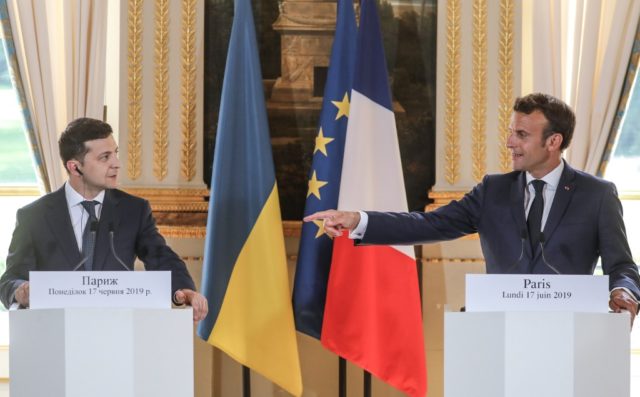
Steinmeier’s Formula: Its Background and Development in the Normandy and Minsk Processes (Part Three)
Publication: Eurasia Daily Monitor Volume: 16 Issue: 132
By:

*To read Part One, please click here.
*To read Part Two, please click here.
On September 18, in the Minsk Contact Group, the Ukrainian delegation, headed by former president Leonid Kuchma, declined to negotiate with Russia and Donetsk-Luhansk toward codifying the Steinmeier Formula into an official document with binding value. This was—and remains—a Russian precondition to holding a summit of the “Normandy” group’s leaders (Russia, Germany, France, Ukraine). The precondition being unmet, the summit is postponed until further notice, and Ukraine has gained at least a short reprieve (Ukrinform, Dzerkalo Tyzhnia, September 19, 20).
The “Normandy” leaders have not met together at that level since October 2016. This hiatus is mainly due to the top leaders’ immersion, from 2017 through 2019, in presidential and parliamentary elections in Germany, in France, for the European Parliament, and finally in Ukraine. Nor were the German and French leaders keen to go for another inconclusive Normandy summit, as the five held in 2014–2016 had been, even as Russia entrenched itself in Ukraine’s Donbas. The 2016 Normandy summit had instructed the Minsk Contact Group (Ukraine, Russia, the Organization for Security and Cooperation in Europe—OSCE, and Russia’s Donetsk-Luhansk proxies) to work out a road map for implementation of the Minsk “agreements” incorporating the “Steinmeier Formula” (see Parts One and Two in EDM, September 24, 25).
Meanwhile, the quadripartite Normandy Group continued holding many meetings at various levels (the ministerial, the top advisors’, and other levels) without decision-making powers. The latest such meeting took place at the top advisors’ level on September 2, in Berlin. There, Ukrainian President Volodymyr Zelenskyy’s representative informally went along (presumably on instructions) with some elements of the Steinmeier Formula regarding “elections” in the Russian-controlled parts of Donbas (Ukraiynska Pravda, September 20).
At present, Russia demands the Steinmeier Formula’s codification into a binding agreement, as the main precondition to holding another Normandy summit. By setting this precondition, Moscow exploits the new Ukrainian leader’s and French President Emmanuel Macron’s impatience (each for his own reasons) for holding a Normandy summit and bilateral meetings with Russian President Vladimir Putin (see EDM, September 17).
At every stage in the tense negotiations since 2015, Ukraine has successfully resisted or wiggled out from signing onto Steinmeier’s Formula (the September 2 lapse—see above—while unfortunate, was informal and is retractable). The Steinmeier Formula has never taken the shape of an officially agreed document. Russia is now pressing to have it codified because it corresponds with Moscow’s literal interpretation of the Minsk “agreements.”
Under the ground rules of this process, the Normandy top leaders’ conclave instructs the Minsk Contact Group (Ukraine, Russia, the OSCE and Donetsk-Luhansk) to work out common positions on specific matters and report back to the top leaders with recommendations for summit decisions. Russia has no right unilaterally to task the Minsk Contact Group to do something. But Russia is trying to do exactly this in practice by demanding that the Contact Group officially codify the Steinmeier Formula in a binding document and then pass it on to the Normandy summit for quadripartite approval as a binding decision. Seeing Macron’s and Zelenskyy’s summit ardor, Moscow is setting these twin preconditions for holding the summit.
The procedure within the Minsk Contact Group corresponds with Russia’s logic that dictated the Minsk “agreements,” whereby implementation decisions (special status, elections, security and law enforcement, border control) must be agreed upon between Kyiv and Donetsk-Luhansk, with Moscow’s and the OSCE’s mediation. Those are, indeed, the topics under negotiation in the Minsk Contact Group. The Steinmeier Formula concerns those topics, directly or indirectly. Moreover, the Steinmeier Formula itself has been relegated from the Normandy summit level to the Minsk Contact Group level since 2016 (see above). Hence, Russia wants the Minsk Contact Group to act on it—and act now, when Moscow sees a moment of unprecedented opportunity.
While the two “people’s republics” (DPR, LPR) are unrecognized as political entities, they are semi-recognized in the Minsk Contact Group in the capacity of parties to the conflict. Russia wants the Steinmeier Formula to be codified in the Contact Group first and by the Normandy summit as the next, crowning move.
These procedures should, first, make Ukraine look like a consenting victim, at least to alleviate German scruples in the Normandy group (this problem is not applicable in the case of France) and to facilitate international acceptance of Russia’s gains. Second, approval of Steinmeier’s Formula by agreement between Kyiv and Donetsk-Luhansk would boost the status of the latter as negotiating parties—indeed, as parties eligible for entering into internationally approved agreements. It would, correspondingly, dent Kyiv’s status, bringing it a notch closer to that of Donetsk-Luhansk as parties negotiating to “solve” a conflict between them. Third, approval of Steinmeier’s Formula in the Minsk Contact Group and the Normandy Four summit formats would open the way for Donetsk-Luhansk “elections” and special status under continuing Russian control. And ultimately, approval of such decisions by the four parties at the Normandy summit would look like turning Russia’s war against Ukraine into an inner-Ukrainian “frozen conflict.”
Although few would pretend (not even Russia) that the conflict would thereby have been solved, Steinmeier‘s Formula would bring the kind of provisional status quo with a deferred outcome. This is what the Steinmeier Formula had been designed in the first place to achieve. It would allow Russia to escape responsibility for a war of aggression, it would hand Russia a large part of the gains from that aggression, and it would allow Germany and France to resume business as usual with Russia. And Macron wants that business to be even better for France, in ways unanticipated by Germany.



